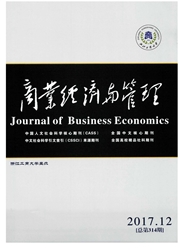

 中文摘要:
中文摘要:
文章基于碳排放责任认定的“生产者责任”、“消费者责任”以及“共担责任”视角,运用产业内贸易理论,分别构建了开放经济下两个国家征收生产型碳税、消费型碳税和混合型碳税的博弈模型。并利用各模型的均衡解,从国家福利、碳排放量和企业利润等方面比较了这些征税方式的效果,分别得出了实现国家福利改善、碳减排和企业发展等目标的条件,并探讨了实现综合目标的可能性。结果表明:分别从实现国家福利改善目标和实现碳减排目标看,混合型碳税均优于生产型碳税;从实现企业发展目标看,生产型碳税优于混合型碳税;任何一种碳税征收方式无法同时实现所有目标,政府必须在三个目标之间有所取舍,在一定条件下消费型碳税或混合型碳税可同时实现福利改善和碳减排目标。
 英文摘要:
英文摘要:
Based on the carbon emission responsibilities of producer responsibility, consumer responsibility and shared responsibility, the intra-industry theory is adopted to respectively build game models of two countries levying single carbon tax on production-generated emission, consumption-generated emission or mixed carbon emission under the open economy. Based on the equilibrium solutions of different models, the effect of different tax types are compared in terms of national welfare, carbon emission and corporate profit and the conditions for such objectives as improving the national welfare, carbon emission reduction and development of enterprises etc. are concluded respectively; furthermore, the possibility of realizing the comprehensive objectives is discussed. The resuhs reveal that about the objectives to improve the national welfare and realize the carbon emission reduction, the mixed carbon emission tax is better than the production-generated emission tax; in term of realizing the development objective, the production-generated tax is better than the mixed carbon emission tax; none of the three tax types can realize all the objectives alone and the government has to choose between the three objectives; under certain conditions, the consumer-generated carbon emission tax or the mixed carbon emission tax can simultaneously realize both the improvement of national welfare and the objective of carbon emission.
 同期刊论文项目
同期刊论文项目
 同项目期刊论文
同项目期刊论文
 期刊信息
期刊信息
